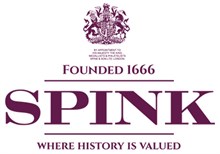26
Waterloo 1815 (Bury Bridge, 1st Reg. Dragoon Guards.), with original steel clip and replacement...
Provenance:
Gray Collection, 1908.
Glendining's, October 1950.
Bury Bridge served as a Trooper in the 1st (King's) Dragoon Guards, commanded by Lieutenant-Colonel W. Fuller. With 32 officers and 555 men, the 1st Dragoon Guards were the largest British heavy cavalry regiment at Waterloo. They were brigaded with the Household Cavalry under Major-General Lord Edward Somerset, and helped to cover Wellington's retreat from Quatre Bras on 17 June. That night Wellington redeployed his army on the ridge of Mont St. Jean, 11 miles south of Brussels, with the village of Waterloo as his Headquarters. He positioned Somerset's Brigade on the reverse slope just west of the Brussels-Charleroi road.
When Napoleon launched his main infantry attack at 1.30 p.m. the following day, consisting of D'Erlon's Corps, he sent Milhaud's Corps of Cuirassiers (armoured heavy cavalry) in support. The French Cuirassiers advanced to the left of the Allied-held farmhouse of La Haye Sainte, catching the Hanoverian Luneberg Battalion in line and annihilating it almost to a man. The Cuirassiers were armed with extra-long sabres which enabled them to thrust at wounded men lying on the ground without leaving the saddle.
Just when Wellington's centre appeared to be crumbling, Lord Uxbridge, commander of the Allied Cavalry Corps, ordered both brigades of British Heavy Cavalry to charge. While Ponsonby's Union Brigade (including the famous 'Scots Greys') made for D'Erlon's infantry, Somerset's Household Brigade engaged Milhaud's Cuirassiers. The Cuirassiers' longer sabres gave them a considerable advantage against their British counterparts, who did not wear cuirasses. Somerset's Brigade was also heavily outnumbered. Despite these handicaps, the British troopers succeeded in routing the Cuirassiers and saving Wellington's position. Somerset's Brigade suffered appalling casualties in this action, the 1st Dragoon Guards losing 7 officers and 37 men killed, 4 officers and 100 men wounded. A further 124 men were 'missing'.
Subject to 20% VAT on Buyer’s Premium. For more information please view Terms and Conditions for Buyers.
Provenance:
Gray Collection, 1908.
Glendining's, October 1950.
Bury Bridge served as a Trooper in the 1st (King's) Dragoon Guards, commanded by Lieutenant-Colonel W. Fuller. With 32 officers and 555 men, the 1st Dragoon Guards were the largest British heavy cavalry regiment at Waterloo. They were brigaded with the Household Cavalry under Major-General Lord Edward Somerset, and helped to cover Wellington's retreat from Quatre Bras on 17 June. That night Wellington redeployed his army on the ridge of Mont St. Jean, 11 miles south of Brussels, with the village of Waterloo as his Headquarters. He positioned Somerset's Brigade on the reverse slope just west of the Brussels-Charleroi road.
When Napoleon launched his main infantry attack at 1.30 p.m. the following day, consisting of D'Erlon's Corps, he sent Milhaud's Corps of Cuirassiers (armoured heavy cavalry) in support. The French Cuirassiers advanced to the left of the Allied-held farmhouse of La Haye Sainte, catching the Hanoverian Luneberg Battalion in line and annihilating it almost to a man. The Cuirassiers were armed with extra-long sabres which enabled them to thrust at wounded men lying on the ground without leaving the saddle.
Just when Wellington's centre appeared to be crumbling, Lord Uxbridge, commander of the Allied Cavalry Corps, ordered both brigades of British Heavy Cavalry to charge. While Ponsonby's Union Brigade (including the famous 'Scots Greys') made for D'Erlon's infantry, Somerset's Household Brigade engaged Milhaud's Cuirassiers. The Cuirassiers' longer sabres gave them a considerable advantage against their British counterparts, who did not wear cuirasses. Somerset's Brigade was also heavily outnumbered. Despite these handicaps, the British troopers succeeded in routing the Cuirassiers and saving Wellington's position. Somerset's Brigade suffered appalling casualties in this action, the 1st Dragoon Guards losing 7 officers and 37 men killed, 4 officers and 100 men wounded. A further 124 men were 'missing'.
Subject to 20% VAT on Buyer’s Premium. For more information please view Terms and Conditions for Buyers.
Orders, Decorations and Medals
Sale Date(s)
Venue Address
General delivery information available from the auctioneer
If required our shipping department may arrange shipment as your agent. Although we may suggest carriers if specifically requested, our suggestions are made on the basis of our general experience of such parties in the past and we are not responsible to any person to whom we have made a recommendation for the acts or omissions of the third parties concerned
Important Information
SALEROOM NOTICES:
WITHDRAWN: 518, 520, 522, 524, 526, 530, 532, 533, 534, 536, 537, 539, 892
LOT 62: Surname part corrected in a neat engraved style.
LOT 161: The Lot is now accompanied by the recipient’s British War and Victory medals.
LOT 200: The Lot is accompanied by a DVD containing approximately 120 minutes of digitalised footage recorded by the recipient during the duration of the War. It provides an important first-hand insight to the campaign and is available to view upon request.’
LOT 218: Traces of brooch mounting.
LOT 286: Surname reads ‘Murray’, officially corrected. This is the medal of 44 Trooper Murray J. Fraser.
LOT 486: The Trio official later claims. Rolls refer.
An invoice showing the total amount due, including buyer’s premium, taxes, postage charges and other fees will be sent to buyers directly by Spink.
For full details please see the Spink Terms and Conditions for Buyers.
Taxes may vary, so ensure that you pay attention to the location of the sale in relation to your own location
Terms & Conditions
Please see here


